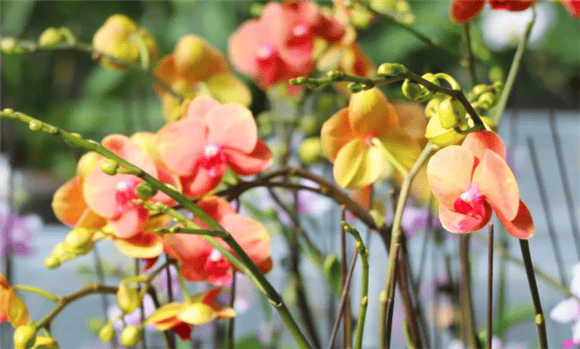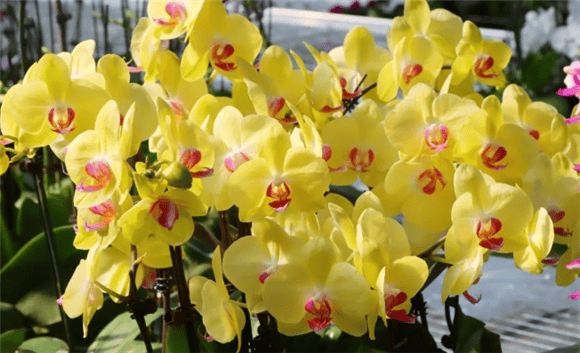Phalaenopsis is a type of orchid. The scientific name Phalaenopsis is composed of the Greek words phala (moth) and opsis (pattern), which means "butterfly-like orchid", and its flower shape also resembles a flying butterfly.

The Phalaenopsis we often see is purple
Phalaenopsis breeding base in Daguikou
Phalaenopsis of various colors compete for beauty
Yellow, white, pink and so on are colorful
Let's enjoy this together
The colorful Phalaenopsis
The Phalaenopsis is named after its flower looks like a flying butterfly
The flower language is I love you , symbolizing nobility and elegance
White-flowered Phalaenopsis: pure love and precious friendship
Red-heart Phalaenopsis: good luck and eternal unity
Red Phalaenopsis: smooth career Happiness
Striped Phalaenopsis: Everything goes well and all your wishes come true
Yellow Phalaenopsis: Your career is prosperous and your business is prosperous
Mini Phalaenopsis: The happy angel comes to life
Winter is coming soon, and florists like to grow Phalaenopsis in winter. They are beautiful, shade-tolerant and have a long flowering period. They are a veritable plastic flowering machine indoors. They bloom in large clusters in pairs, so you can enjoy them for most of the year! Today Huahua will give you a detailed introduction to the maintenance methods of Phalaenopsis. Including how to raise Phalaenopsis orchids and how to deal with Phalaenopsis orchids that have faded.
How to raise Phalaenopsis? How to care for Phalaenopsis!
1. How to buy Phalaenopsis?
First of all, when you go to the flower market to choose Phalaenopsis, it is best not to buy potted ones, but to buy them planted individually in transparent nutrient pots. The planting material is sphagnum moss, because it is easier to observe the root system through the transparent nutrient pots. Not easy to root rot!
2. Do not repot the Phalaenopsis orchid with sphagnum moss
Do not repot the Phalaenopsis orchid with sphagnum moss because it now has flower buds. If you give it At this time, disturbing the root system can easily lead to the loss of buds and no flowering, so we can maintain it in the original water tundra pot;
If you don’t like the original transparent nutrient pot that looks ugly, you can directly cover it with a plastic pot. Just use a flowerpot of about the same size, so that when it comes time to water, you can take it out, water it separately, and then put it back in the pot after watering.
3. How to water Phalaenopsis?
Before watering the Phalaenopsis, you can observe its root system through a transparent nutrient bowl. If the root system is green, it means it is not short of water and there is no need to water it for the time being; if the root system is white, it means that it is not short of water. It lacks water and needs to be watered thoroughly.
In addition, you can also poke 2-3 centimeters into the sphagnum moss with your fingers. If it feels dry, then water it. If your fingers feel that the sphagnum moss is moist, do not water it.
4. How to fertilize Phalaenopsis?
Don’t fertilize the Phalaenopsis orchid you just bought with buds for the time being, because fertilizing when the buds are there will easily eliminate the buds; just water them normally and wait for the flowers to bloom. If you want to fertilize, the flowers will bloom. Apply again after you finish!
Phalaenopsis likes thin fertilizer. Just water the flowers with plenty of water-soluble fertilizer, but the concentration should be diluted to 2500 times. No. 1 and 2 should be applied alternately. Temperatures above 30 degrees and below 10 degrees or during flowering should be temporarily used. Do not fertilize.
5. What are the temperature requirements of Phalaenopsis?
Note: The newly purchased Phalaenopsis must not be placed in a place where the temperature is too low. It is very afraid of cold and will suffer from frostbite below 10 degrees. It is best to keep the room temperature above 15 degrees.
6. How do Phalaenopsis bask in the sun?
Don’t expose the Phalaenopsis orchid that you just brought home to the sun. Keep it in a semi-shady place for 1-2 weeks. After the leaves become firm and the buds and flowers are normal, slowly move it to a place with good sunlight, such as Indoor south balcony, south window sill and other places with good lighting.

What should I do if the Phalaenopsis flowers fade?
How to deal with the faded Phalaenopsis orchids? You can start from the following three aspects: pruning, fertilizing, and changing pots and planting materials!
1. Pruning
If the branches turn yellow and shrivel after the flowers bloom, it means that the nutrient consumption is relatively large and the orchid seedlings are weak. Cut off the flower stalks at the root to save nutrients and let it grow.
2. Fertilization
The growth period is from March to July after flowering. Apply more nitrogen fertilizer. Do not fertilize when the temperature is high in summer. After September, apply more phosphorus fertilizer and potassium fertilizer to promote flower bud differentiation. The fertilizer should be thin and do not apply thick or heavy fertilizer.
3. Change pots and plant materials
Palaenopsis will grow new leaves as soon as they are raised. If yours does not grow, it means there is something wrong with the way you grow it, and the roots may not be there. OK, you can try changing pots and planting materials.
Flower pots
Disposable transparent nutrient bowls and plastic bottles can be used to grow Phalaenopsis by drilling a few holes. Hollow pots can also be used. They have good air permeability so that the roots can grow strong. If you feel ugly, put a basin outside.
Alise pots and terracotta pots are also acceptable, but watering must be controlled, do not water from above, just pour it into the tray and let it absorb by itself.
Never use lazy flower pots to grow them. Although there is water, there is no ventilation, and it is easy for the roots to become stuffy and rotten!
Remove the white shell outside the lazy pot and only use the black basket inside.
What should I do if the Phalaenopsis does not bloom?
1. Whether the orchid seedlings are mature?
First determine whether your Phalaenopsis orchid is mature. The seedlings must have more than 5 leaves before they are mature. Some varieties require 7 leaves. Only when they are mature will they grow every year. All bloom.
2. Large temperature difference
Phalaenopsis undergoes flower bud differentiation in autumn and winter. It takes more than a month to grow flower arrows. During this period, there must be a large temperature difference of 8 to 12 degrees. The temperature difference It is the most important condition for drawing flower arrows.
So when the air gets cooler in autumn, put it next to the window to raise it. The temperature difference next to the window is large.
3. Appropriate water control
The plant material should not be too wet during the flowering stage. If it is wet, it will give it a signal to continue growing leaves, and nutrients will be used for growth instead of flowering. , so water should be controlled appropriately, the roots should turn white, and the plant material is almost dry before watering again.
4. Apply high-phosphorus fertilizer
If the Phalaenopsis has healthy roots and thick leaves, then apply phosphorus and potassium fertilizers from the spring and autumn growing seasons, and water the flowers with water-soluble fertilizer every 15 days. In the sphagnum moss, mix 1 gram with water 2500 times, and apply in rotation at No. 1 and No. 2.
Stop fertilizing until the flower buds germinate and show color.
If you also love orchids and want to take them home

 扫一扫微信交流
扫一扫微信交流
发布评论